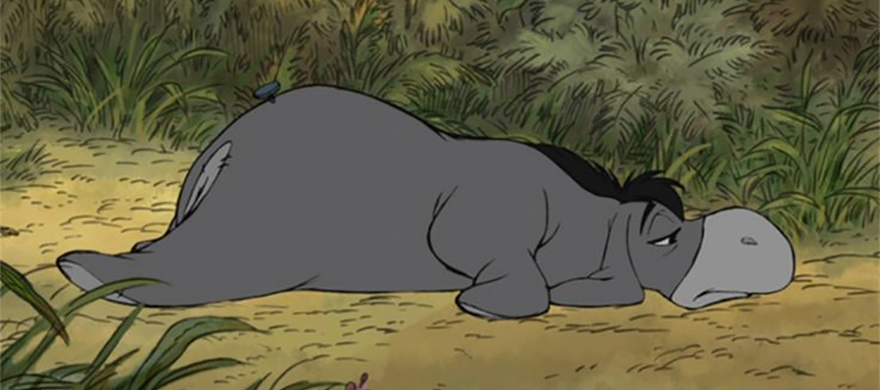My son Oliver has a book on opposites that features old illustrations of Winnie the Pooh characters. He calls it his “Pooh book.” Each part of the book has two pictures that are in some way opposite to each other. For instance, one part shows Pooh and Piglet gathering around a fireplace with the heading “Warm,” while the other picture shows them sitting on a fence out in the snow with the heading “Cold.” After reading it several times—and I do mean several—he’s gotten pretty good at describing what’s going on to me. One of his favorite portions is a scene that shows on one page a dejected-looking, and tail-less, Eeyore with the heading “Sad,” while the other page shows Eeyore standing on his head with his tail back on and the heading “Happy.”
I read an article a while back on how to better involve children in stories when reading to them. The person writing the article mentioned something that made perfect sense but that I honestly hadn’t considered before: They said that reading provides an opportunity to learn and practice empathy.
This shouldn’t really be news to anyone. It’s fairly common knowledge that stories allow readers to live vicariously through different characters, and when those relationships grow strong, it’s not uncommon for a reader to experience the emotions of those characters as they continue to read. What I hadn’t considered is how powerful stories could be when used as a tool to teach children about empathy, or if I can use another word instead: compassion.
Think about it for a moment. How do children learn something like compassion? How do you teach a child to be compassionate? It’s one thing for a child to learn actions of compassion (or at least sympathy) through imitating others. If you kiss a child’s “boo-boo” enough times, they’ll start kissing yours. But it’s a whole separate challenge to teach a child to give you a kiss when there’s no tangible reason that they should, no reason at all but that you need one.
There’s a scene in the movie Jaws where the main character, Brody, is sitting at the kitchen table, stressed from all that’s been going on. After a few moments, he notices that his son, who is sitting across from him, is mimicking everything he does, from covering his face with his hands, to lacing his fingers, to eventually—once Brody catches on—making a growling face. Brody then pulls his son over and says, “Give us a kiss.” His son asks why, and Brody replies, “Cause I need it.”
The Greeks had a uniquely tangible way of looking at compassion. Splagxnízomai, one of the Greek words from which we get our word compassion, means “to be moved in the inward parts,” or in other words, to have your stomach tied in knots. They believed that a compassionate person actually ached for those he cared about, or perhaps more accurately, ached with them.
Walter Wangerin’s lovely work of fantasy The Book of The Dun Cow displays a beautiful portrait of this. It comes in a moment when the main character, Chauntecleer, is grieving over the loss of ones he loved. It’s at that moment that this mysterious creature, the dun cow, appears.
Chauntecleer watched his own desolation appear in the brown eyes of the Cow, then sink so deeply into them that she shuddered. Her eyes pooled as she looked at him. The tears rose and spilled over. And then she was weeping even as he had wept a few minutes ago – except without the anger. Strangely, Chauntecleer felt an urge to comfort her; but at this moment he was no Lord, and the initiative was not in him. A simple creature only, he watched – felt – the miracle take place. Nothing changed: The clouds would not be removed, nor his knowledge plenished. But there was this. His grief had become her grief, his sorrow her own. And though he grieved not one bit less for that, or yet his heart made room for her, for her will and wisdom, and he bore the sorrow better.”
With all this in mind, you can imagine my excitement when my son started to pick up on the emotions of the characters in his “Pooh book.” When I first saw him point to the picture of the head-standing Eeyore and say, “Look! He found his tail! He’s happy!” I wanted to jump up and down and stand on my own head.
Stories provide an escape for us, the kind of journeys that bring us back changed. They teach us how to observe the world, as well as all that inhabit it, in new ways. They give us insight into people’s thoughts and motives, and they help us develop relationships in ways that we might not otherwise be able to. My son may never get to go on adventures like the ones that Winnie the Pooh and his friends had, but through the power of story he can be changed the way those characters were, and those changes will spill over into his relationships. To me, that’s a magical thing.
- The Wild Truth About Coming Home - May 13, 2019
- Reading With Compassion - March 5, 2018

Well done